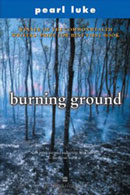Burning Ground Excerpt

She is a half-kilometre down the cut-line before she really thinks about what shes doing. Getting away was easy. After seventy-five millimetres of rain, a searing blow torch couldnt keep a fire going, and she is, she justifies, leaving only one day earlier than scheduled.
She reported the weather at 1:00 p.m., as usual, and boldly added, Ill be away from the radio for the rest of the afternoon.
Let them think what they will; when its this dull and wet no one bothers to question. For all they know she wants to turn her radio off and go back to bed. Maybe she wants to read, or meditate, or play Mozart uninterrupted by the inevitable belch of radio static. Perhaps they even imagine her baking moistly fragrant whole-grain breads or struggling over long cheerless letters to friends who have half-forgotten her existence. More likely, they dont think about her at all. Imprisoned by the forest, she has nowhere to go.
Unless, as Percy has, she were to pore over the map charting a route to somewhere else. She has the directions in her pocket: past the old airfield and down the cut-line until she crosses a second cut-line. East on that one until she meets up with the old logging road, straight until she hits gravel, then one more cut-line after that and she will have arrived at the edge of the lake. Maybe shell even be lucky enough to hitch a ride on the gravel road. If she walks briskly, and keeps her pace steady, she will be there in five or six hours. Less if she can catch a ride.

Through drizzle so fine it is barely a mist, she strides along the well-worn path, wades forward through tall grass she must push aside, skirts pools of water, and steps carefully across waterlogged muskeg. Her jeans are soaked to the waist before she gets to the other side of the old airfield, and she knows shed be better off in a lighter fabric, something that wont hold its weight quite so relentlessly, wont chafe her thighs, but shes gone too far to turn back now. It would take twenty minutes to walk back to the cabin to change, another twenty to retrace her steps, and shed be forty minutes into the afternoon and only beginning where she is. Better to deal with wet jeans.
A half-kilometre farther down the cut-line and her socks begin to bunch. Her hiking boots are nylon and water resistant, but already she can feel her feet getting wet and cold. She stops once to adjust her socks and tries to tighten her laces, but the boots fit poorly and still the socks inch down over her heel, down, down, a bit at a time until each wrinkle fits like a tiny pebble under her arch. The socks are 100% cotton, loose at the ankle to start with, already wet and gritty. She limps over them, unsure whether to take them off or leave them on as unlikely insurance against blisters that now seem inevitable.
Tall grasses, young willows, and baby spruce are unavoidable. She brushes past, bends them and holds one gloved hand behind to protect herself from their whipping return, but she cant escape water flung as each one soaks her with shake after shaggy shake.
To take her mind off her feet, she thinks about Marlea, who always wears a leather biker jacket, even in the rain. Heavy and black, loaded with buckles and zippers, Marlea wears it with dresses, too, as if the excess, the contradiction of her willowy and undeniable grace, provides her with strength. Her body is an ink drawing in lengthy, slender lines. Her jacket is a lovely abomination.
Percys practical and unfashionable anorak, waterproof says the label, blackens and sticks to her body. Her mosquito jacket, worn over top, protects her from the incessant insects but also blurs her vision and makes the world surreal. Yea, as she walks through the valley of insects. Yea, as she walks through a Vaselined world. Just beyond the net, hundreds of mosquitoes hover and whine and mill about, drawn from the forest floor by the heat of her efforts, impatient for the smallest bite of unprotected flesh. The longer she walks, the larger the swarm. Even as she sloshes, wet and uncomfortable because of drizzle and muck, she wishes the rain would intensify. Better solid sheets of water than this fluttering and tenacious following.
More than two hours later, just as Percy begins to doubt the accuracy of her map, she comes to a definite intersection. Although this path, too, has grown wild with grasses and weeds, heavy clay ruts are clearly recognisable as those belonging to a road rather than another cut-line. She is nearly halfway to her destination. Her clothes are soaked through, and her feet, when she leans against a tree to check, are an unfleshly white, wrinkled as colourless raisins. She wrings sand and muddy water from her socks, and as she pours a small stream from each boot, she curses herself for not splurging on a better pair.
She risks a look at her watch, fruitlessly waving her arm against mosquitoes, then tucks her glove inside the wristband and secures the Velcro fastener once again. On this trail, she does not feel crowded by leaves and limbs but can follow her road far into the distance, as far as the long hill several kilometres off, and so she walks with new vigour, tries even to run, although her heels rub inside her boots and her jeans ride low and weighty on her hips. She wants to fly over the surface, to outrun the bugs, but clay builds in layers on the bottom of her boots, forms soles as heavy as steel, and she slows to a socket-straining trudge. On she plods, on and on, over the hill in the distance, around a long-off curve and then another and another, past a place where the road has washed away, where she measures with her walking stick the depth of the water, watches as the water rises to her kneesthe mud, water, cold, all one, no longer separate annoyances, but one big obstacle.
After that, for a while, she removes her boots and carries them, squeezed one under each arm, thinking it will hurt less to walk barefoot than to plod along in bunched socks and boots so heavy she can hardly lift them, squoosh, squoosh, squoosh, each step another assault on near-bleeding heels. But her feet, without boots, feel fleshless and icy, attend to every pebble in the mud and find thistles in what looks to be nothing more than chickweed growing soft between ruts Percy now stomps through, slides into, cusses, and finally simply sits in, not caring about bears, or bugs, or the time that rolls through the afternoon all too quickly.
Finally, knowing it could be days before she is found if she does not go either backward or forward, knowing she can die, can get eaten alive, by insects or bears, Percy picks herself off the ground and wades into a puddle where she washes the mud from both battered feet and pulls a thistle from the ball of her left. She takes a long drink of water from a bottle in her pack and stares into the distance. She has come too far to go back. She must go forward.
Eventually, true to her map, Percy comes to the gravel road, which she follows to the final cut-line. She walksstaggers, reallynearly one kilometre more, then rounds a bend. There, planted solidly in the middle of the cut-line, head lifted, curious, is a sight that should put her arm into immediate motion, should set her walking stick rattling as ball bearings anxiously strike steel in the hollow cap. Instead, she stops in mute wonder and stares, astounded, at a bear so unlike any other that it does not occur to her to be frightened.
A brown bear, she supposes, although what she registers is a thick creamy coat, not scruffy and matted and slept in like other bears she has seen near her tower, but full and fluffy-looking, as if only recently shampooed and carefully blown dry by some elite bear-grooming establishment deep in the woods. What makes the creamy coat even more astonishing is the chocolate trim that accents ears and snout, that surrounds soft black bear eyes and covers chocolate bear paws solid and heavy with mud, yet somehow belying danger, as beautiful and innocuous-looking as a Coca-cola® polar bear, as an Australian koala. A bear like no other bear, and all Percy can do is stand with her eyes straining wide, walking stick still and mute at her side.
The bear takes a step forward, not threateningly, but appearing only curious, like a large, shy puppy that has not yet made up its mind whether to wag or bark. She takes a step back and begins, somewhere in the vague backdrop of conscious thought, to consider her options. Run, drop, scream. Not one of the three makes any sense. Instead, her slumping shoulders straighten, the pain in her legs disappears, and her lips spread wide in a grin that has nothing to do with fear or nervousness. She is acutely focused, and yet she merely waits to see what will happen next. She has no camera, but she doesnt mind that this is a sight for memory only, just waits, poised like the bear, grinning as if at some long lost friend whose reappearance has left her overjoyed and infinitely speechless.
Read the opening of Burning Ground or Buy Burning Ground in Canada
More About Burning Ground & Madame Zee
Search this site: